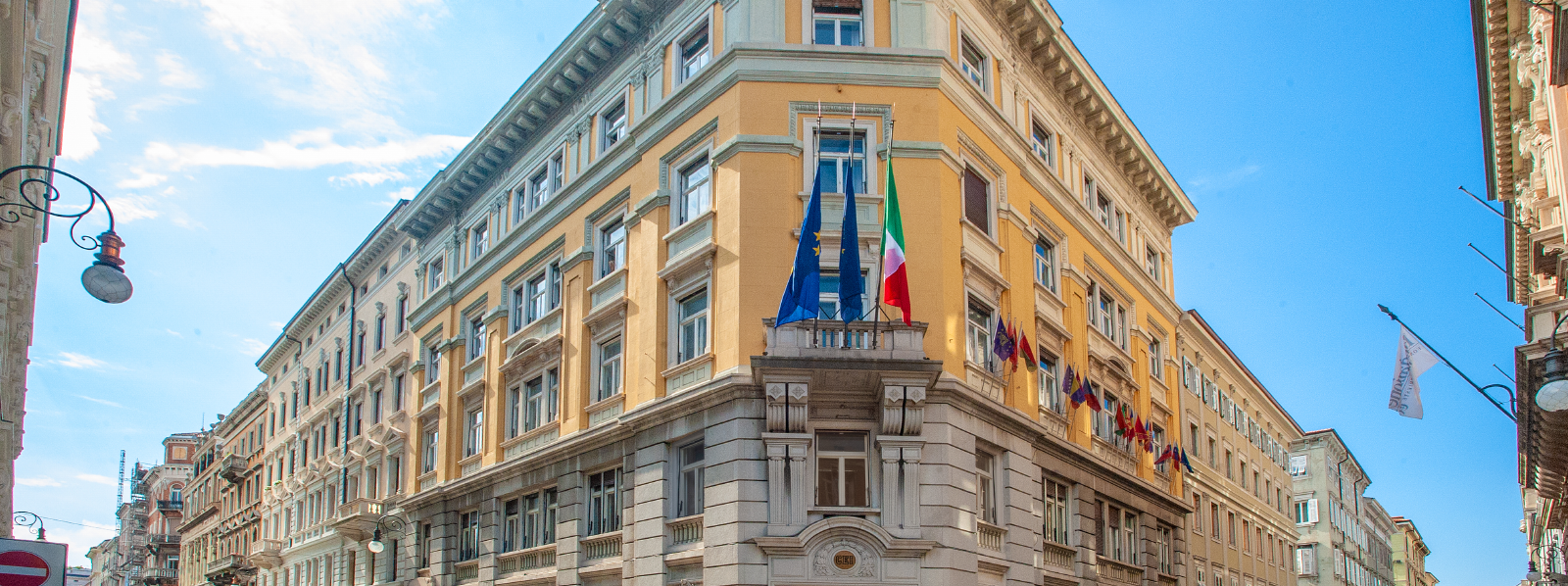The CEI-Executive Secretariat (CEI-ES) was established in Trieste under the Austrian CEI Presidency in 1996.
It operates with the legal status of an International Organisation, based on a Headquarters Agreement concluded between the Italian Government and the CEI Presidency.
The CEI-ES provides administrative and conceptual support to the CEI pillar system (Governmental, Parliamentary, Economic and Local Dimensions). It also manages its funds and instruments and takes appropriate initiatives aimed at promoting the realisation of the Organisation's mission.
The seat in Trieste, via Genova 9, was made available to the CEI by the Italian Government through the Friuli Venezia Giulia Autonomous Region, free of charge and ties, under terms described in a Protocol concluded between the CEI Secretariat and the Region.
Since its establishment, the CEI-ES was headed by Ambassador Paul Hartig (Austria) from 1996 to 2001; Ambassador Harald Kreid (Austria) from 2002 to 2007; Ambassador Pietro Ercole Ago (Italy) from 2008 to 2009; Ambassador Gerhard Pfanzelter (Austria) from 2010 to 2012. Ambassador Giovanni Caracciolo di Vietri (Italy) from 2013 to 2018. Roberto Antonione (Italy) from 2019 to 2024. As of 2025, Franco Dal Mas (Italy).
Executive level as of 1 January 2025
- Secretary General, Franco Dal Mas
-
Franco Dal Mas started his assignment as CEI Secretary General in January 2025. A graduate of the University of Trieste, he is a trained lawyer with experience in civil and criminal cases.
As a Councillor of the Autonomous Friuli Venezia Giulia Region for two terms (1998-2003 and 2008-2013) - during which he chaired the Productive Activities Commission - he dealt with the implementation of European legislation and economic relations with the Balkans.
As a Senator of the Italian Republic (2018-2022), he was a member of the Justice Commission. He proposed several justice-related bills and served on the Joint Commission for the implementation of the Special Autonomy Statute of the Trentino-Alto Adige Region.He is co-author of a short essay on the sustainability of the healthcare system edited by the “Editoriale Scientifica”, Naples (Italy).
- Deputy Secretary General, Zsuzsanna Kiraly
-
Zsuzsanna Kiraly started her assignement as CEI Deputy Secretary General on 1 May 2022. She studied law at the University of Budapest and started working in 2001 at the Ministry of Foreign Affairs and Trade of Hungary, working in its Legal Department until 2007.
Later, she moved to Milan as a Deputy Chief of Mission at the Consulate General of Hungary, responsible for consular affairs and for developing bilateral relations. After 2013, she worked under the State Secretary for Administrative Affairs and as a Deputy Head of the Department of Human Resources.
She led the consular section at the Consulate General of Hungary in New York, being the Deputy Chief of Mission, between 2014 and 2018. From November 2018, she started working under the Deputy State Secretary for the Development of European Relations.
- Deputy Secretary General, Ivana Pejović
-
Ivana Pejović started her assignement as CEI Deputy Secretary General on 11 May 2025. She holds a Master’s degree in Hotel Management from Rome (2001) and a Bachelor’s degree in Law from the University of Belgrade (1988).
Ms. Pejović served as Deputy Secretary General at the Ministry of Foreign Affairs of the Republic of Serbia from April 2024 to May 2025. From 2019 to 2023, she was Consul General of Serbia in Istanbul, and previously served in the same role in Milan from 2004 to 2013. Between her consular assignments, she was Assistant Secretary General at the MFA (2013–2019). She also held senior positions at the Ministry of Trade and Tourism, including Deputy Minister (2000–2001), Adviser to the Minister (2001–2004), and Assistant Minister (2004).
Earlier in her career, she served as Municipal Secretary for the Municipality of Savski Venac and practiced law as an attorney in Belgrade.She has completed diplomatic training in Malta, holds the Bar Exam (1991), and is ECDL Core certified.
- Deputy Secretary General, Yurii Mushka
-
Yurii Mushka started his assignment as CEI Deputy Secretary General on 4 June 2025. He graduated in 1991 from Taras Shevchenko University of Kyiv as a specialist in international relations.
He joined the Ministry of Foreign Affairs of Ukraine in 1991 and has since held a number of high-ranking diplomatic positions. Most recently, he served as Ambassador at Large (2022–2025). He was Ambassador Extraordinary and Plenipotentiary of Ukraine to the Slovak Republic from 2016 to 2022, and to Hungary from 2003 to 2006 and again from 2010 to 2014. From 2006 to 2008, he was Ambassador of Ukraine to the Republic of Korea.
He also served as Director-General of the Second European Department, covering Central and Eastern European countries (2014–2016), and previously held the same portfolio as Head of Department (1998–2000) and Acting Head (2003). Mr. Mushka represented Ukraine to the Danube Commission during his mandates in Hungary and served as its elected Secretary.
His earlier postings include several diplomatic assignments at the Ukrainian Embassy in Hungary, where he worked in various capacities from 1993 to 2003. He holds the diplomatic rank of Ambassador Extraordinary and Plenipotentiary (2017).

